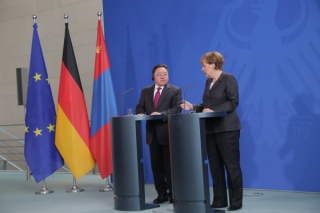ID :
359081
Wed, 03/04/2015 - 12:27
Auther :
Shortlink :
https://oananews.org//node/359081
The shortlink copeid
President and Chancellor of Germany hold press briefing

Ulaanbaatar /MONSTAME/ The President of Mongolia Ts.Elbegdorj, who is paying a working visit to the Federal Republic of Germany, and the Chancellor of the Federal Republic of Germany Ms Angela Merkel held a meeting on March 3, following which the Excellencies called a press for briefing.
Ms Merkel had learned that one percent of the Mongolian population speaks German language, Mr Merkel noted, "this is an excellent bridge for our bilateral relations". "I am pleased to welcome Mongolia as the Official Partner-Country for ITB-2015, and its President Mr Elbegdorj--to open the ITB", she said.
In 2011, Germany and Mongolia concluded an Agreement of Bilateral Cooperation in the mineral sector, "in frames of which the sides established a profile technological school," she said but noted that much "greater efforts must be put to implement all the agreed objectives of the Agreement".
"Germany-Mongolia bilateral relations are very special. We do enjoy active political relations, however, our economic cooperation has remained relatively slow. Over the past period, the sides failed to implement our joint economic project to the level we wished," Ms Merkel said.
In response, the leader of Mongolia Elbegdorj noted that Mongolia views Germany as its main partner in Europe. "I am happy for the fact that Mongolia has been chosen as the Partner-Country for ITB-2015, the world’s largest tourism fair. I am also very glad that Chancellor Angela Merkel and I had a wonderful opportunity to meet each other and discuss our bilateral relations and cooperation and exchange views on issues of regional character," he said and reminded the gathered that Madame Chancellor visited Mongolia in 2011 and the Mongolian side Germany--in 2012.
Mongolia endeavors to expand its relations and cooperation with Germany in every field, the President went on and stressed that Mongolia "will work actively to implement the agreed goals and objectives of the bilateral relations".
After this, the dignitaries answered some questions. "You have mentioned that the two countries are yet to achieve active economic cooperation, especially in the minerals sphere. Mongolia has huge mineral resources and is interested in supplying Germany and Europe with mineral resources, such as rare earths etc. What is needed at policy level in order to shorten the physical distance between the two countries?" the Mongolian reporter asked. To this Ms Merkel said,"We need to cross three roads. Firstly, for infrastructure projects, the sources for initial investments need to be established. We do encounter financial problems with projects we have agreed on. Secondly, in order to extract minerals, necessary infrastructure needs to be put in place. The deposits of interest are located in remote provinces. Thirdly, Mongolia has two big neighbors who have their own positions and versions of development of roads and transportation infrastructure. If one wants to speak to Mongolia, it will have to speak to these two neighbors as well."
The President answered that the two countries must most scrupulously implement the Agreement of Cooperation in the Minerals Sector. Further on, Mongolia is proposing Germany to study the possibilities for establishing an economic cooperation agreement as Mongolia wishes to develop a comprehensive economic cooperation with Germany, he said. "If our two parties establish such an agreement and manage to have it ratified by parliament, it will create a splendid environment for promoting extensive bilateral relations. I do believe that we have much room for cooperation on this front. Railroads are our main transportation infrastructure.”
Mentioning that Mongolia and Russia hold a joint investment of 50% each in Mongolian railroads, the President said that during the visit of the President of the PRC to Mongolia last fall, the two governments signed "an excellent agreement on transit transport through the territory of China. The agreement indicated the routes, the ports and the level and scope of concrete soft conditions that China accords Mongolian transit transport," he said. A similar agreement can be established with the Russian Federation as well, he noted.
"The two countries do not have any major infrastructure connections except for the direct flight operated by Mongolia, and infrastructure is indeed the basis for other types of relations," said another journalist and asked how Germany views the possibilities for a participation in expanding infrastructure cooperation. Ms Merkel answered that the airline companies of our countries maintain relations in the civil aviation, on which Germany will work on, supporting and expanding the relations. Mr Elbegdorj said Mongolia is a landlocked country, therefore, air transportation is vital for her development. Mongolia pursues greater connectivity with Europe, thus can serve as a land and air hub located between Russia and China. “We are now building a new airport. Mongolia will be extremely pleased to start-up any joint project in this field with Germany," he said.
The President noted that Mongolia held her first ever democratic election in July of 1990, marking this year the 25th anniversary of establishment of a democratic governance in Mongolia. "Mongolia strives to be a role model in the region in spheres of human rights, rule of law, in openness and transparency. Our two neighbors have always affirmed their respect for the choice of the Mongolians. Mongolians never doubt in the rightness of this choice made 25 years ago, Mongolia will work to further consolidate our choice,' he said.
"We are grateful to Germany for its support and assistance and for sustained cooperation with Mongolia," concluded the President.





